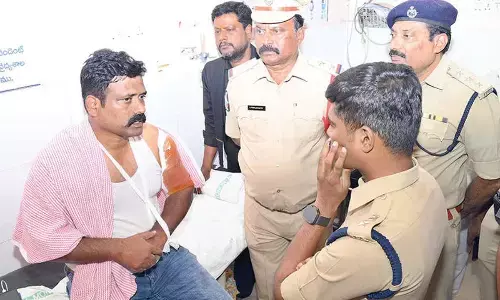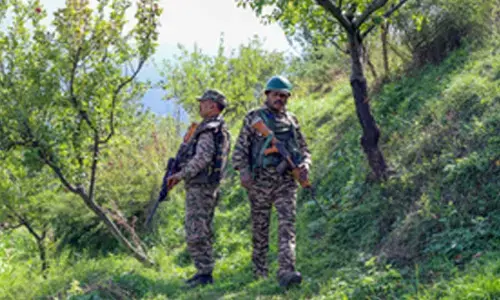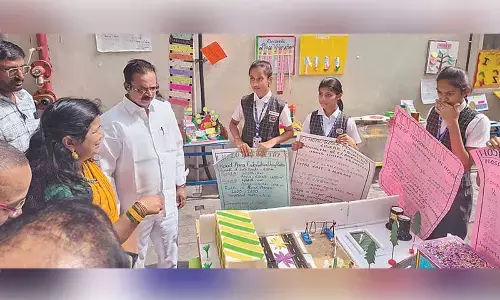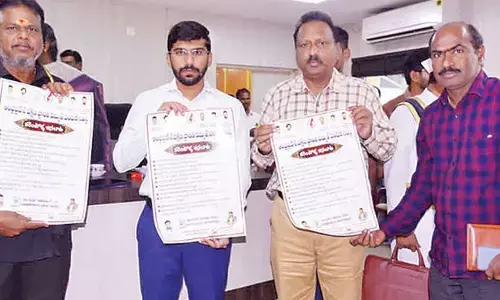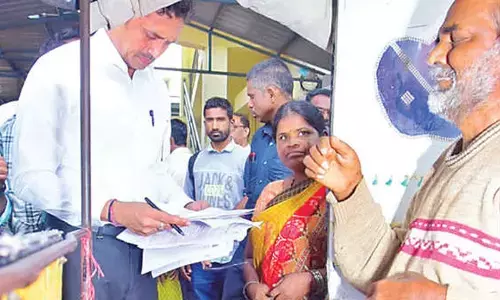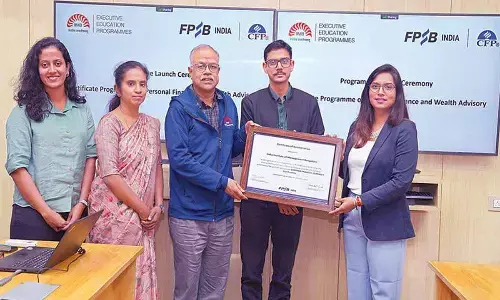UNABASHED REALPOLITIK
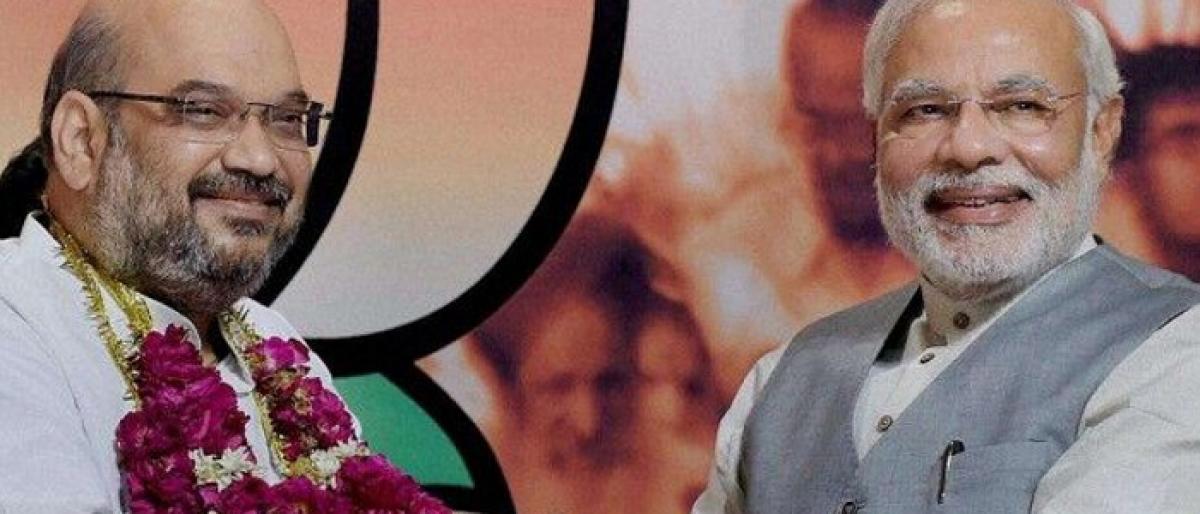
The fight for Chief Ministership in Karnataka will continue to be raging whether the Karnataka Chief Minister B S Yeddyurappa wins the vote of confidence or not. Though the BJP initially claimed that there was no stopping of its juggernaut which is now bound towards capturing south, it is now clear that all these developments will have a serious impact on the national politics ahead of the 2019 ge
The fight for Chief Ministership in Karnataka will continue to be raging whether the Karnataka Chief Minister B S Yeddyurappa wins the vote of confidence or not. Though the BJP initially claimed that there was no stopping of its juggernaut which is now bound towards capturing south, it is now clear that all these developments will have a serious impact on the national politics ahead of the 2019 general elections.
The BJP perhaps never expected that the actions of the Governor would become so messier and chaotic and that the ghosts of Goa, Manipur and Meghalaya would raise their heads questioning the integrity of the office of Governor. The consequences of the outcome of high drama in Karnataka will pose a new challenge for the BJP and the developments will be very complex. The BJP which rode to power with the slogan of ushering in a new era and promised to bring radical changes in the body politic of the nation seems to have erred in its judgement.
The elections to Karnataka Assembly has now presented a grand opportunity for the Congress party to take on the BJP. Caught in its own web, it is now trying to recall the mistakes and blunders that were committed in the past by other political parties and quoting them as precedents to attack the opponents. This is not the “Badlav” people had expected from BJP.
The BJP has been quoting the past examples and saying that Congress has suspended the Constitution when the Allahabad High Court had set aside the election of Indira Gandhi and she wrecked vengeance against the country and its people by imposing emergency and putting leaders of all shades in jail. But then the BJP should also understand that whenever Congress played such dirty games, it had suffered nay it was mauled in the elections and even Indira Gandhi was not spared.
Now there is every possibility that fight for power in Karnataka between BJP, Congress and JD(S) may lead to uniting non-BJP parties sooner than later. Such a situation would not have arisen if the political parties, particularly the BJP, had risen above egos. The ongoing drama reminds me of a statement of then Prime Minister H D Deve Gowda when he was replying to a no-confidence motion in Parliament.
It was clear that Deve Gowda would have to step down. But then the Congress appeared to be too much in a hurry and was disrupting him. Deve Gowda who was at his best of wit and humour, referring to how the then AICC president Sitaram Kesari called him as Prime Minister in hurry. The Congress in its attempt to pull down the Deve Gowda-led government showed undue haste and hurry to occupy the chair just as the BJP is now doing in Karnataka.
When an audio alleged to be a discussion between Gali Janardhan Reddy and Basanna Goud was leaked wherein Reddy told Goud that if he supports BJP his life would be settled, the BJP says it is fake audio dubbed in theatres in Hyderabad. Presuming that it was dubbed, can the BJP claim that it has not made any effort to reach out to any MLA from the opposite camp? Did the MLAs who supported them in Goa, Meghalaya and other places come forward impressed by the policies of BJP?
The actions of BJP have once again raised several questions about the Governors institution. In the early days of the Republic, the Governor was like “like a full moon at midday.” His primary role, like that of the Queen in England, was to be the sagacious counsellor who would be consulted, and who would warn and encourage. His powers were limited, but he had an important constitutional role to play. This ideal has, however, steadily eroded over time, and Governors have come to act — and be seen — as partisan political animals, a tendency that the Supreme Court has repeatedly assailed.
The Governor of a state is an appointee of our political system who is expected to perform the role of checks and balances. The role of Governor is set out in Part VI of the Constitution and Article 153 which clearly state that there will be a Governor for states.
When the issue was being debated, Sardar Patel sought to make it clear that there would be no “invasion of the field of ministerial responsibility.” The “special powers” would be limited to sending a report to the President of India when “a grave emergency arose, threatening menace to peace and tranquillity.” However, an amendment moved by K M Munshi was adopted which empowered a Governor to take over the administration of a province when there was a threat to peace and tranquillity and the Governor felt the elected government could not carry on working in accordance with the advice of his ministers.
The Seventies and the Eighties saw en masse sackings of state governments particularly during the regime of Indira Gandhi followed by others in retaliation. The growth of regional parties and coalition politics after this made the Centre careful about the exercise of Article 356, but it by no means stopped the creative use of the Governor’s office for political purposes.
The trend continued. Governors in Bihar, when Lalu Prasad was seen as getting powerful by the NDA, or conversely when Nitish Kumar was emerging by the UPA, were seen to have been used to trying and seizing the political initiative.
In 2006, Supreme Court found fault with the Bihar Governor Buta Singh for his decision to dissolve the Assembly. Jagmohan in 1984 during his stint as Jammu and Kashmir Governor had dismissed the elected government in the state which led to longest stint under central rule than any other state.
The act of Vajubhai Vala in Karnataka is no less controversial than the decisions taken by the previous Congress Governors. It is just like the pot calling the kettle black. But then this kind of action was not expected from BJP which rode to power promising radical changes both political and otherwise.
The need of the hour for BJP is not to recall the bad experiences of the past to justify its present actions, but to look at the high values that were displayed by their own leaders in the past, and create a healthy political atmosphere in the country. They should take the example of Atal Behari Vajpayee who resigned because he did not have majority; he went back to the people and became the Prime Minister with a proper mandate.
What is most painful is that to remain saddled in seat of power, the BJP in Karnataka is now resorting to divide the MLAs in the opposite camp on the basis of caste and is turning it into Lingayats v/s Vokkaligas. It’s time the political parties both national and regional should realise that the game of managing and manoeuvring victories cannot succeed every time and everywhere. The political leaders should stop looking at people as vote banks and understand that they have greater intelligence than the leaders.









